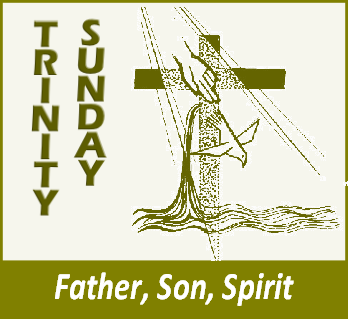12 June 2022
Proverbs 8:22-31 Romans 5:1-5 John 16:12-15
|
SMA SUMMER SCHOOL 2022 |
The Trinity is the defining doctrine of our Christian faith, the central statement about thekind of God we believe in. We are baptized “in the name of the Father and of the Son and of the Holy Spirit” (Mt 28:19). We begin our formal and informal prayers with this Trinitarian formula. The great Eucharistic prayers of the Mass end with the beautiful Trinitarian prayer: ‘Through him (Jesus), with him, and in him, in the unity of the Holy Spirit, all glory and honour is Yours, Almighty Father, forever and ever’. The Trinity is not just a dogma of our faith, or a formula to be recited in our liturgy, but the dynamic core of our Christian way of life.
Yet, for many people the doctrine of the Trinity, of three persons in One God, has often been presented in a way that is abstract, complicated, and unrelated to our everyday lives. This was brought home to me by an experience I had when I was working in Liberia in the 1980’s. The Local bishop had asked me to review a new catechism for use in his diocese. On reading it, I was surprised to find that its author had omitted the doctrine of the Trinity. I mentioned this to the Bishop who asked me to raise the issue with the author. This I did and he said: ‘I decided it was best to leave out the Trinity. It’s far too complicated, too abstract, for the local people to understand, and anyhow it will make no practical difference in their lives.’ I suggested that he should refer to the Trinity, using the language of the Bible, that the people were familiar with, rather than the language of Philosophy.
The Triune God, as revealed in the Bible, is not some remote, eternal, immutable being, but a God who come close to us: the birthing God of creation; the Spirit God drawing life out of chaos and enabling a universe of creatures to evolve and flourish; God, the Word incarnate, taking on and reshaping our human history. The God of the Bible is the God who is gloriously present everywhere and in everything, the God who makes all things great, intimately connected to one another, and of eternal significance, as the poet Elizabeth Barret Browning acknowledges in her poem Aurora Leigh:
‘And truly, I reiterate, nothing’s small!
No lily-muffled hum of a summer bee,
But finds some coupling in the spinning stars;
No pebble at your foot but proves a sphere;
No chaffinch but implies the Cherubim;
And (glancing at my own thin, veined wrist),
In such a little tremor of the blood
The whole strong clamour of a vehement soul
Doth utter itself distinct. Earth’s crammed with heaven,
And every common bush afire with God;’
God’s closeness to us is particularly manifest in the life and ministry of Jesus of Nazareth. In him we meet a God who goes in search of men and women and rejoices when a lost son finds his way back to the house of his Father. The God of the Bible is a God of love, who cares for all creatures from the smallest to the greatest, a passionate and compassionate God, capable of being deeply moved by the sufferings of his creatures. This is the God who is Father, Son and Spirit. The doctrine of the Trinity is profoundly relevant to our everyday lives for it is ultimately about what it means to be human persons created in the image of this God of Love.
To be human means to be like the God who created us, the God in whom all creatures live and move and have their being, and who are intimately connected with one another. It means to live in relationships of love and respect not only for our fellow humans, but for all God’s creatures with whom we share the gift of life. We are called to participate fully in the Trinitarian communion of Father, Son and Spirit through our loving communion with one another and, indeed, with all creation. And, as members of the Church, we are called to be witnesses of this awesome destiny in a world thirsting for love. I will end with a short reflection, written by Michael Fitzgerald, MAfr, and Rene Dionne, MAfr. It is entitled ‘A God Who Sends Forth’ and it conveys in clear simple language the meaning and significance of today’s great feast.
God sent his Son.
The Eternal Word, spoken by the Father from all eternity and present in all things from the first moment of creation, was translated into the language of human experience. People saw and heard and touched God on earth.
The Father and Son sent their Spirit.
The Church was born of that Spirit,
and its mission begins.
The Spirit impels,
The breath of God quickens,
making us witnesses for Christ,
sharers in his mission of redemption and mercy,
empowering us to “renew the face of the earth”.
Movement.
Timeless movement of three-Personed God.
Inexhaustible movement of love
in which it delights to catch us up.
“Go forth… I send you… Fear not,
I am with you.”
We are sent.
We are gift that is given.
We are the imprint of his presence.
We are grace.
Michael McCabe SMA, Cork
To listen to an alternative Homily from Fr Tom Casey of the SMA Media Centre, Ndola, Zambia please click on the play button below.
|
|

